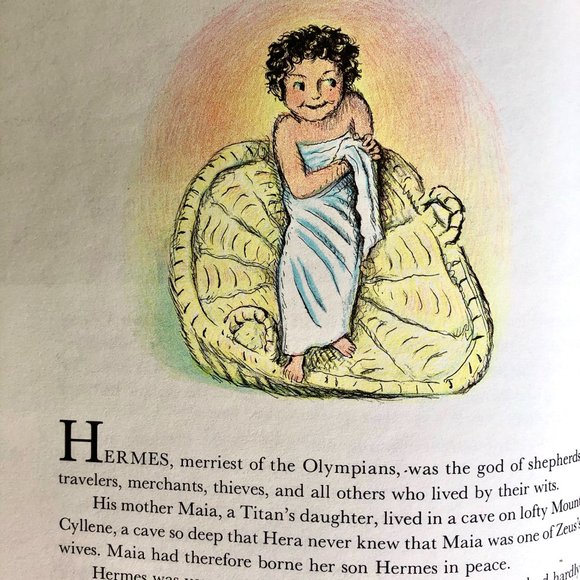I finally did it. I got my hands on a hard copy of D'Aulaires’ Book of Greek Myths. Actually, it's very accessible and readily available on Amazon; I just had to apply my powers of recollection to track it down. Regular readers may recall that I mentioned this beautifully illustrated collection of Greek mythology in a previous post on Celtic Mythology for Kids (Pinard). In that post, I mentioned my childhood babysitter Majel and how she sparked within me a deep love for Greek mythology. This year, I was able to truly share that love with my own kids who begged me so often to tell them these stories that I found the most obvious solution that I ought to have come up with much sooner: buy them this book.
 |
| The original publication of this book featured a bright yellow cover. |
 |
| The modern publication features the same image on a black background. |
Despite a few aesthetic changes to the cover, I found a paperback edition of this 1962 publication of retellings and illustrations by husband and wife duo Ingri and Edgar Parin d'Aulaire. The 2017 copy that we now own features all of the gorgeous original illustrations along with an Afterword that includes biographical information about the authors/illustrators, along with some of their original sketches. After being prodded daily to read from this book, I'd say we got our money's worth. The retellings are accurate (from my understanding of the ancient myths) without being too graphic or explicit. It's safe to say that Zeus was a ladies' man...but that consent from the other party wasn't exactly a requirement in his "relationships". The d'Aulaires still share some of the darker aspects of mythology (think: Oedipus, Persephone, or -my personal favorite- Prometheus), but in a way that I would consider age appropriate. While stating that Zeus "had a lot of wives" or "many children with women other than Hera [his main wife]" isn't the entire picture, it's enough for young readers.
Kids will loves the story of Hermes, one of the few characters of the Greek pantheon we meet as a baby. Clever, witty, and full of mischief, even the most austere of the Olympians are fond of him -- and so are we. Pan, the ugly god of nature is reminiscent of SNL's "goat boy". As unlikely as it sounds, Pan and the Olympian Apollo are equally unlucky in love as the objects of their desire (Syrinx and Daphne, respectively) opt to turn into plants rather than marry them -- an aspect of the story that my kids found wildly amusing. And, despite its dark(ish) end, isn't it kinda funny that Narcissus wastes away and dies because he falls so deeply in love with his own reflection that he forgets to eat or drink? Well, we thought so. Dumb ol' King Midas turning his family into gold wasn't enough; he had to go make a big deal out of a music competition and ended up with donkey ears. (Read it. It makes sense.) His ultimate demise recalls the story of Abou Hassan from One Thousand and One Nights. [Quick Context Comparison: King Midas is so ashamed by his donkey ears that he leaves his throne and flees to the woods. Abou Hassan is a wealthy merchant who, at his elaborate wedding feast, lets out such a huge fart that he flees the country -leaving his beautiful new wife- for ten years on account of his embarrassment.]
 |
| Naughty baby Hermes is perhaps one of our family favorites. |
.jpeg) |
| My oldest -ever the creator- made a family tree for the main Olympians (and a few of their Titan ancestors). |
